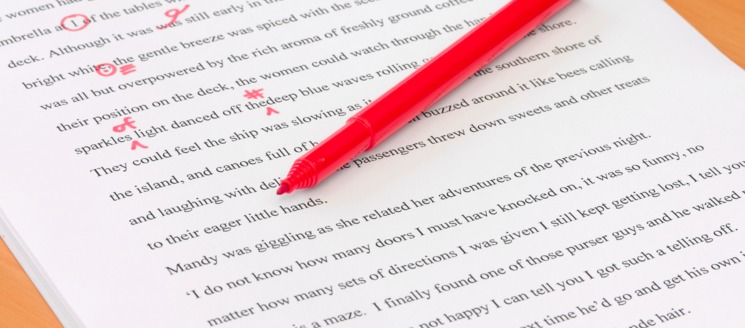![]()
Some of you may have attended one of my Digital Gov University classes, or listened to a webinar, or even taken my class at GovLoop Academy.
One of the questions I frequently get is how I got started.
That question always surprises me. I’ve been thinking/editing/considering/teaching plain language for a long time, and it’s hard to trace back.
But it goes back to middle school. While my dad’s an effective communicator, he’s never been a good speller, and I am. So he’d bring home pieces either written by or destined for “the General” and ask me to take a look.
From the moment I took up a red pen, I was hooked.
You know how some people like crossword or jigsaw puzzles? Editing is the same thing.
Nothing like diagramming a sentence and saying, “Well, he may not have meant to say this, but this is what he’s saying according to the grammar” to make editing a logical career.
Nothing like asking “who’s doing what in this sentence?” to make me realize that some people can’t get their meaning across–or don’t even know what they mean to say.
Nothing like saying “Can we scrap this entirely and start over?” to make me realize that some people could be entirely on the wrong track and not realize it.
The activity of editing made sense from the beginning. Sentence structure reveals itself like a skeleton, correct words (not the homonym) falls into place, excess material is sliced away.
If I were poetry-minded, I’d say it’s an act of artistic revelation.
But I’m firmly in the prose world, so I’d say it just made sense.
This led to a rainbow of jobs: proofreader, editor, teacher, trainer, websites manager, web content editor, web content strategist. But these all included the basic act of picking up a tool and working on content.
No one wants to. Writing is hard. Editing is sometimes worse. But if you’re going to have content, whatever the kind, you have to look at it from the audience perspective. Otherwise you’re wasting your time.
I doubt the general ever knew that a seventh-grade schoolgirl was editing his work. I’m pretty sure my dad never told him.
But my plain language career started with the red pen and a few printouts on the dining-room table.
Katherine Spivey is part of the GovLoop Featured Blogger program, where we feature blog posts by government voices from all across the country (and world!). To see more Featured Blogger posts, click here.





This is such a great story–thanks for sharing!
Thanks for sharing your story! So cool how you got into editing and how it led to your career.
I’ve always felt that editing is fun in the same way a jigsaw or crossword puzzle is fun so I was glad to read I’m not the only one! Nice to hear your story, thanks!
Great story! Everyone must have the same thought… what was the name of that general?
Loved reading this and seeing a piece of your past. I guess we all have a “plain language story.” Thank you for sharing such a beautiful snapshot into your life.
Editing is like being a music producer or recording engineer…maybe both. Too many view it as criticism. But it’s not. What the editor is doing is looking for the soul of the document and trying to do what is needed to let that soul come through. Maybe it needs LESS drums than the band thought it does. Maybe the guitar player needs to turn down a bit. Maybe it needs more space between this part and that. It may end up sounding different than when the band initially went into the studio, but the *song* comes to life.
As the husband of a professional proofreader/editor, I recognize the “artistic revelation” involved in good editing and plain writing. I have a respect, appreciation, and even envy for your skills and talent.
I didn’t realize anyone but me recognized the utility (and fun!) of diagramming sentences. I can’t always remember the names of the parts of speech and such, but diagramming sentences engraved the correct ways of constructing sentences into my brain. Thanks!